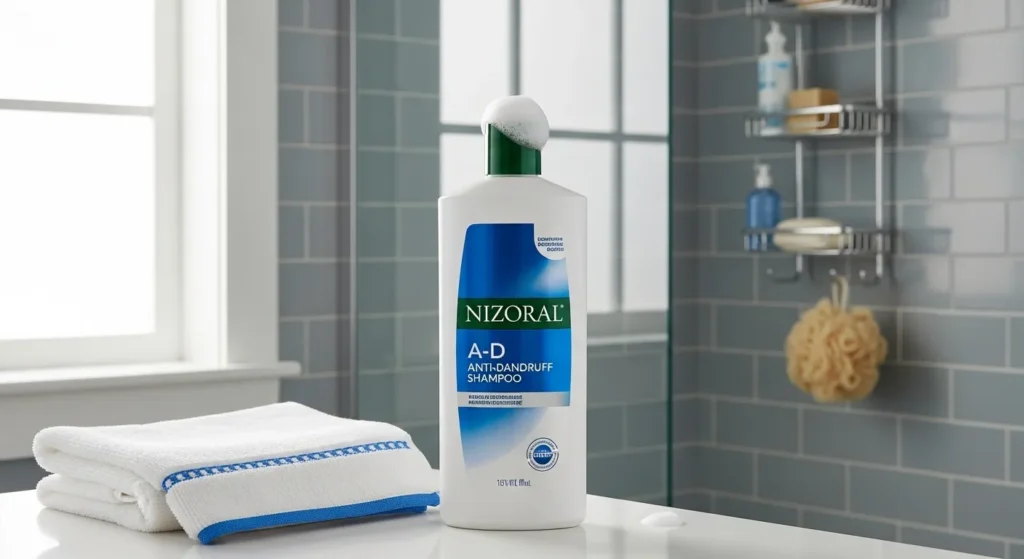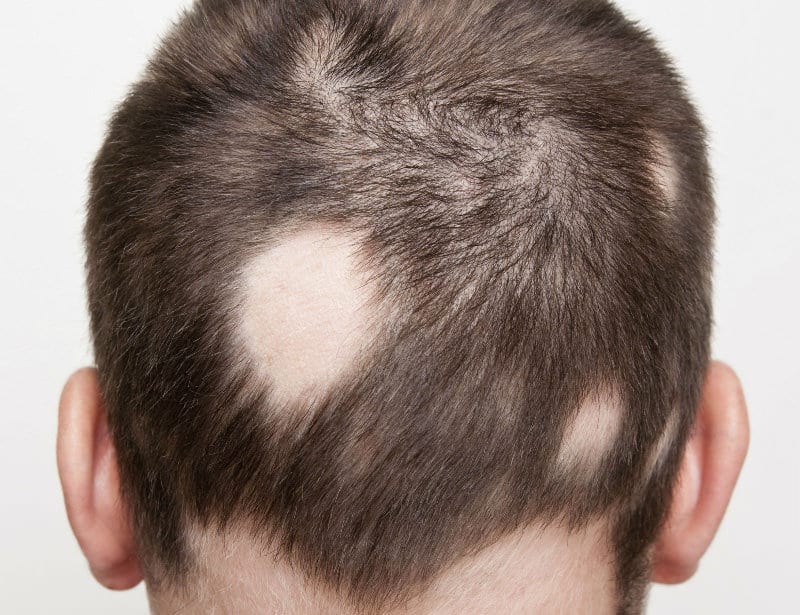Noticing more strands in your shower drain after using Nizoral shampoo? Does Nizoral cause hair loss, or is something else at play?
This article dives into the science behind Nizoral’s active ingredient, how it interacts with your scalp, and whether it can truly lead to hair loss or even help prevent it. We’ll uncover the facts, clear up common myths, and provide expert-backed advice on how to use Nizoral safely for your scalp and hair health.
What Is Nizoral and Why Is It Used?

Nizoral is a medicated shampoo primarily used to treat fungal infections of the scalp, such as dandruff and seborrheic dermatitis. It contains ketoconazole, an antifungal agent that reduces inflammation and eliminates the fungi that often cause itching, flaking, and irritation.
Active Ingredient: Ketoconazole Explained
Ketoconazole is an antifungal compound that disrupts the cell membranes of fungi, preventing their growth. When used topically in shampoo form, it helps clear scalp infections and restore healthy skin conditions.
Common Uses in Dermatology and Hair Care
- Treating dandruff and seborrheic dermatitis
- Reducing inflammation on the scalp
- Managing symptoms of psoriasis (in some cases)
- Used off-label to support hair growth in androgenic alopecia
Prescription vs. OTC Nizoral Shampoo
- 1% Ketoconazole: Available over the counter
- 2% Ketoconazole: Prescription-strength and more potent
Understanding the Link Between Nizoral and Hair Loss
The concern about hair loss often arises from misinterpreted symptoms or coincidental timing.
Reported Side Effects of Nizoral Shampoo
According to the label and studies, Nizoral is generally well-tolerated. However, some users may experience:
- Dryness or itching of the scalp
- Mild irritation or burning
- Increased hair shedding (rare)
Can Ketoconazole Disrupt the Hair Growth Cycle?
There is no solid scientific evidence that ketoconazole directly causes permanent hair loss. It may support hair retention in certain conditions. However, irritation or allergic reaction can temporarily disturb hair follicles, leading to shedding.
How Hair Loss May Be Misattributed to Nizoral
Many users begin Nizoral after noticing scalp issues or hair fall. If shedding continues, they often blame the shampoo, when in fact, the underlying cause (like androgenic alopecia) is still active.
Does Nizoral Cause Hair Loss? What the Science Says
Clinical Studies on Ketoconazole and Hair Health
Surprisingly, some research suggests ketoconazole may help reduce hair loss:
- A 1998 study found that 2% ketoconazole was comparable to minoxidil (2%) in promoting hair density in men with androgenic alopecia.
- The shampoo helps reduce scalp inflammation and may block DHT (a hormone linked to hair loss) at the follicular level.

Nizoral for Dandruff vs. Nizoral for Hair Regrowth
- Dandruff Treatment: Relieves flaking and itching.
- Hair Regrowth: Emerging off-label use in hair loss treatment routines.
Important: Nizoral alone is not a standalone hair regrowth treatment, but it may complement others like minoxidil and finasteride.
When Hair Loss Could Happen: Realistic Scenarios
While rare, some individuals might experience hair shedding from Nizoral. Let’s explore why.
Overuse or Misuse of Nizoral
- Using it daily without recommendation can dry out the scalp
- Over-cleansing may damage the hair shaft and follicles
Allergic Reactions or Sensitivity
Some people are allergic to ketoconazole or other ingredients in the shampoo, causing:
- Redness
- Scalp peeling
- Hair shedding due to inflammation
Underlying Scalp Conditions Mistaken for Side Effects
- Telogen effluvium
- Psoriasis
- Fungal infections were already causing hair fall before Nizoral was introduced
Does Nizoral Help with Hair Growth?
Ketoconazole as a DHT Blocker
Ketoconazole has anti-androgenic properties, meaning it may block the effect of DHT, one of the main causes of male pattern baldness.
Comparison with Other Hair Loss Treatments
| Treatment | Action | Effectiveness |
|---|---|---|
| Nizoral | DHT-blocking, antifungal | Supportive |
| Minoxidil | Vasodilator | Proven regrowth |
| Finasteride | Oral DHT blocker | High efficacy |
How to Use Nizoral for Hair Health Safely
- Use 2–3 times per week
- Leave on scalp for 3–5 minutes
- Rinse thoroughly and follow with a conditioner
- Avoid using it daily unless directed by a dermatologist
User Reviews and Case Studies
Real-World Experiences: Hair Loss vs. Hair Regrowth
- Some users report initial shedding (common with many scalp treatments)
- Others note thicker, healthier hair with regular use
Short-Term vs. Long-Term Use Impact
- Short-Term: May cause dryness or scalp sensitivity
- Long-Term: Often beneficial when used properly in a regimen
Expert Tips for Safe Use of Nizoral
Recommended Application Frequency
- Twice weekly for dandruff or mild hair shedding
- Avoid daily use unless prescribed
Complementary Products for Scalp Health
- Gentle sulfate-free conditioner
- Scalp serums with niacinamide or caffeine
- Minoxidil (if targeting regrowth)
When to Stop Using Nizoral and Seek Help
- Increased irritation or redness
- Worsening hair loss
- Scalp rash or itching persists beyond 2–3 weeks
Alternatives to Nizoral for Sensitive Scalps
Mild Anti-Dandruff Shampoos
- Selsun Blue (selenium sulfide)
- Head & Shoulders (zinc pyrithione)
Natural Remedies for Dandruff or Scalp Irritation
- Tea tree oil shampoos
- Apple cider vinegar rinses
- Aloe vera scalp masks
Choosing the Right Product for Hair Loss Management
- Consult a hair specialist
- Identify underlying conditions (e.g., hormonal imbalance, stress, fungal infections)
- Use targeted products rather than self-diagnosing

FAQs About Nizoral and Hair Loss
Can Nizoral cause shedding before regrowth?
Yes, some users may notice initial shedding as clogged follicles clear and scalp inflammation reduces. This is temporary.
How long can I use Nizoral continuously?
Use 2–3 times a week for up to 8 weeks, then reassess with your doctor. Continuous long-term use should be supervised.
Should I stop Nizoral if I notice more hair fall?
Pause use and consult a dermatologist to rule out allergy or other causes. Don’t panic—shedding doesn’t always mean damage.
Is Nizoral suitable for all hair types?
Yes, but those with dry or color-treated hair should use a conditioner afterward to prevent brittleness.
Final Verdict: Does Nizoral Cause Hair Loss or Prevent It?
Nizoral does not typically cause hair loss when used correctly. It may support scalp health and assist in regrowth when part of a broader hair care strategy. However, overuse, allergic reactions, or existing scalp conditions could lead to temporary shedding. Always follow medical advice and monitor your response closely.
Concerned about hair loss or scalp irritation? Book a consultation with Dr. Rana Irfan, ABHRS-certified hair transplant surgeon in Islamabad. Get a personalized treatment plan for hair loss, dandruff, and other scalp concerns—backed by medical expertise and proven results
